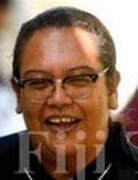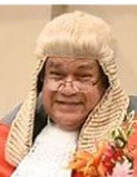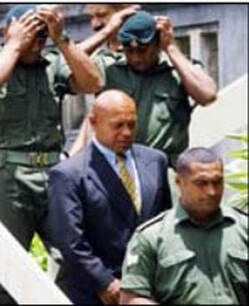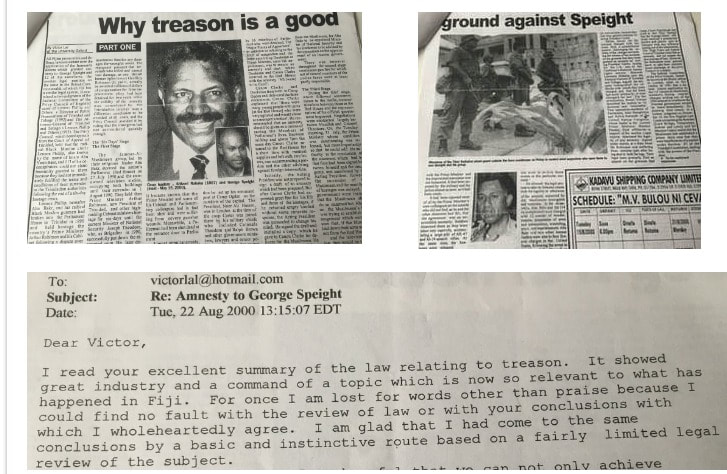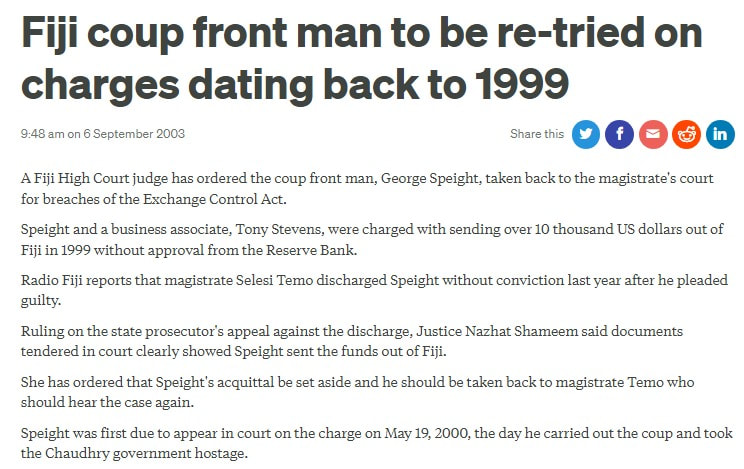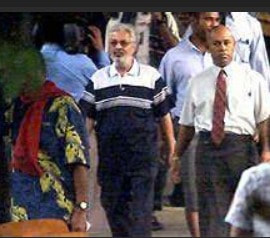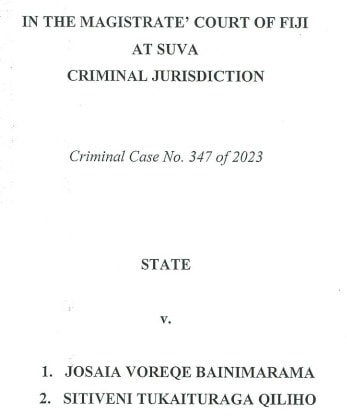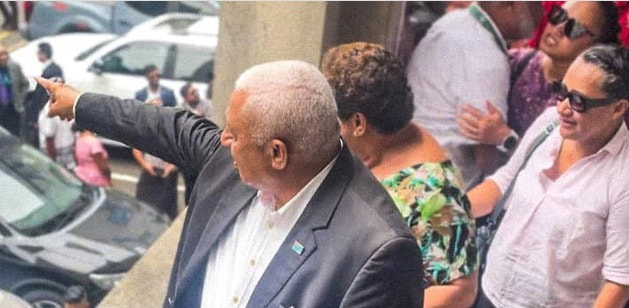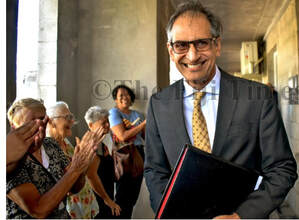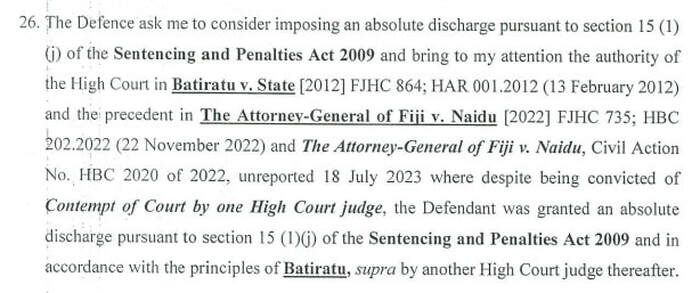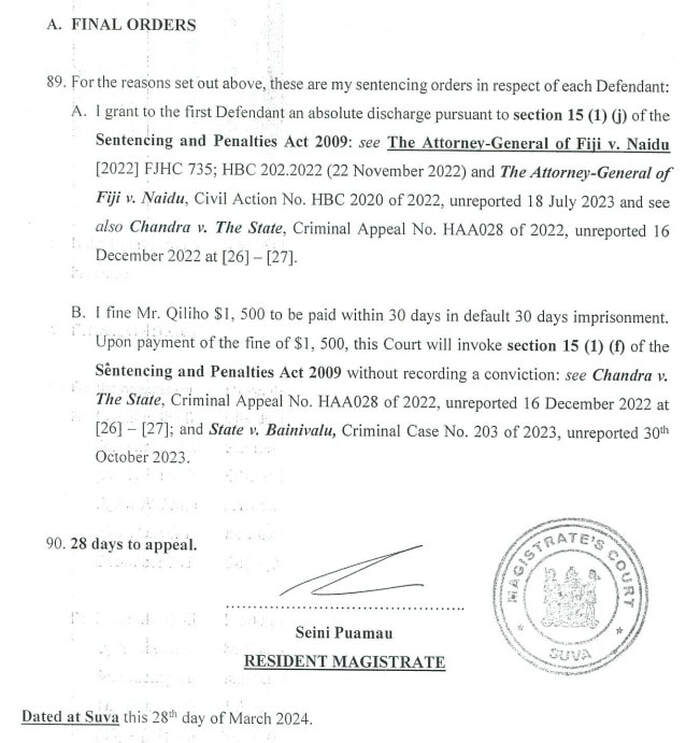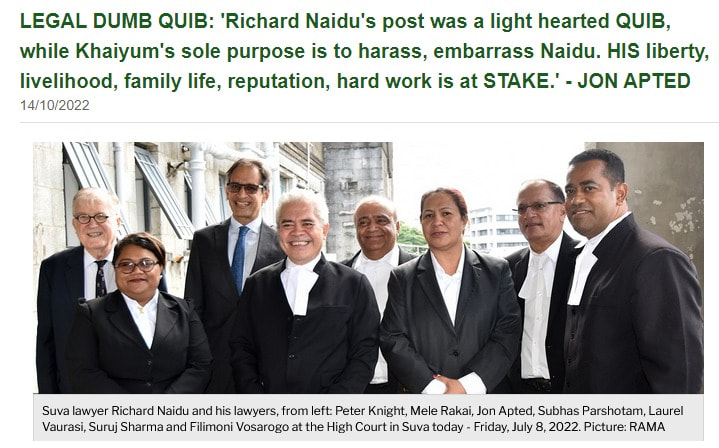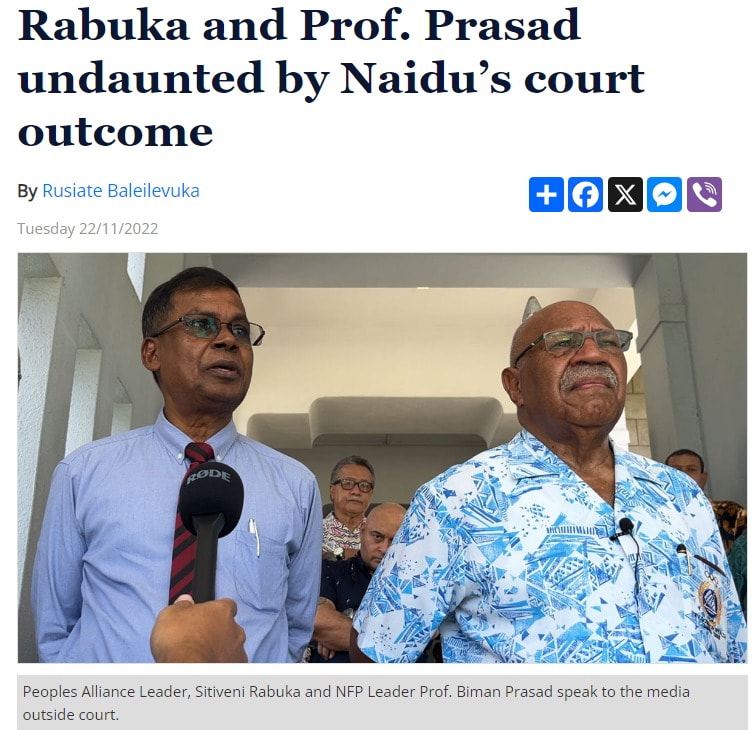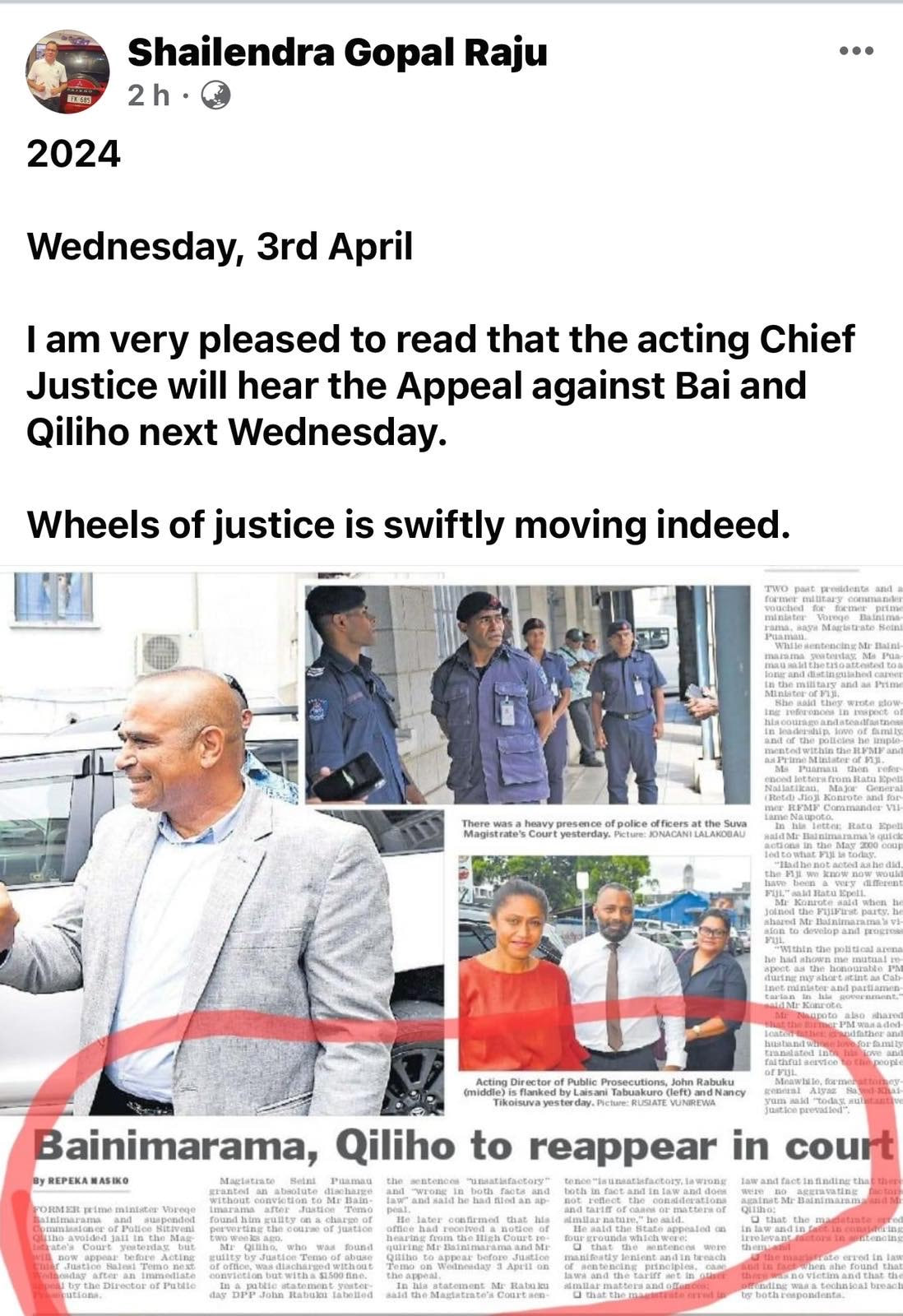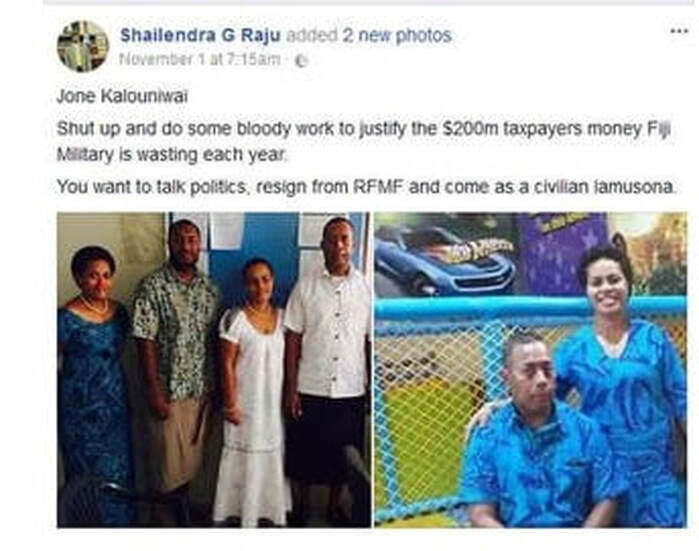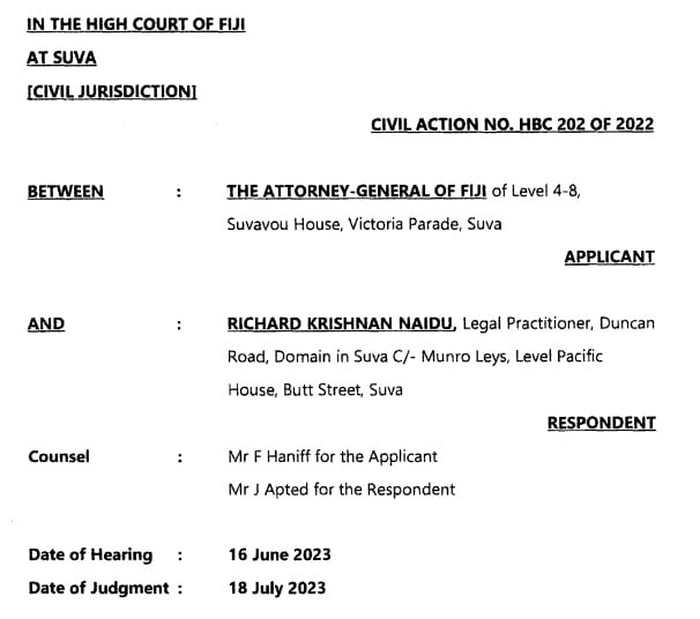*Temo MUST recuse himself from the case on the grounds of the perception of BIAS, the 'fair-minded and informed observer' test. Since he directed that the original acquittals be over-turned, and a guilty verdict entered against Bainimarama and Qiliho, Temo must recuse himself from hearing the case.
*In 2001, we had forced Temo to quit hearing the case against one of George Speight's co-conspirators, who was related to the then chief magistrate Salesi Temo.
*Further, on 26 July 2001, Fiji's High Court had overturned magistrate Temo's decision that would have allowed George Speight to contest a seat in the country's general election in August 2001.
* Justice Peter Surman had ruled that Temo did not have the jurisdiction to allow Speight and fellow coup plotter Ratu Timoci Silatolu (released lately from prison) to lodge nomination forms as political candidates for the 2001 general election.
* In 2003, Justice Nazhat Shameem had ordered that Speight be sent back before magistrate Temo to be re-tried for breaches of the Foreign Exchange Act. Temo had discharged Speight without conviction in 2002 after Speight had pleaded guilty.
There were widespread allegations in 2000 that Salesi Temo, with his pro-George Speight rulings, was a Speight sympathizer, a charge he reportedly dismissed.
*On 20 September 2000, the Fiji High Court had intervened and had ordered magistrate Temo not to rule on treason charges against coup leader Speight and 11 other detainees, preventing their release. |
“Magistrates' courts in Fiji are hereby directed to refrain from making any further orders relating to the purported immunity of persons from prosecution in connection with the immunity decree,” Surman stated.
*Speight's lawyers had originally sought a ruling from the High Court as to whether the decree applied to the charges of treason but Temo had declared that he had the power to make the decision.
*The government could appeal if it disagreed, he stated, indicating that he would free Speight.
* Speight's case had to wait for a High Court ruling on the immunity decree. He and his jailed associates were challenging their detention on the grounds that the military granted them an amnesty under the July 9 Maunikau Accord signed between Speight and armed forces chief Frank Bainimarama, which ended the 56-day parliamentary hostage crisis.
*If Temo had ruled that the defendants were covered by the immunity decree they would have faced only minor charges and could have been freed on bail that day.
*Speight and his co-defendants were so confident of their release from Nukulau prison island that they had come to the court with their suitcases.
* Temo had also dismissed a case against a Speight supporter charged with shooting two soldiers and a British photographer in a melee, on grounds which Speight was also seeking to have applied: an amnesty agreed with the RFMF.
*Our Founding Editor-in-Chief who had written on the validity of the Muanikau Accord that was later used as a template by the DPP against Speight and his group before the Fiji High Court had (and continues to) suppress the identity of the Fiji High Court judge below:
Fijileaks: As we had argued previously, we had felt that what was done by the new Attorney-General Siromi Turaga was wrong. If Richard Naidu was unhappy with the Fiji High Court judgment that found him guilty of scandilizing the court, he should have appealed the same.
*That was his lawful right. We were surprised that the application was dismissed but then conviction which had already been entered by the High Court was then set aside.
*In our opinion, it is not proper for one new Office Holder (A-G Turaga) to show weakness of character by criticising his predecessor and then deposing that he was in Richard Naidu’s camp, and he would not have filed the contempt proceedings or that the institution of the proceedings was wrongful.
*Contempt is a matter for the Court. If you bring it to the Court’s attention, it is then up to the Court to deal with it.
Here, the Court had already dealt with it.
People’s Alliance Leader, Sitiveni Rabuka and National Federation Party Leader Professor Biman Prasad says they are undaunted by the result of prominent lawyer, Richard Naidu’s case outcome after being found guilty for contempt scandalising the court.
Speaking outside the courthouse after the ruling this afternoon, Rabuka says in a way this is a relief as they have been waiting, anticipating, thinking this or that and just have to respect the decision of the court.
The People’s Alliance Leader says even though they will be without Naidu as a candidate, the People’s Alliance and NFP will continue to campaign for the general elections.
Rabuka adds that they promise to canvas support within the law and make sure they tell their supporters and candidates what can happen to a prominent lawyer and a prominent citizen, and to be careful.
Meanwhile Professor Prasad says that Naidu is a man of integrity.
Professor Prasad adds that he was looking forward to having Naidu in the NFP team however he knows that Naidu is with them.
The NFP Leader says they are focused on winning the general election and forming government. Fijivillage
Speaking outside the courthouse after the ruling this afternoon, Rabuka says in a way this is a relief as they have been waiting, anticipating, thinking this or that and just have to respect the decision of the court.
The People’s Alliance Leader says even though they will be without Naidu as a candidate, the People’s Alliance and NFP will continue to campaign for the general elections.
Rabuka adds that they promise to canvas support within the law and make sure they tell their supporters and candidates what can happen to a prominent lawyer and a prominent citizen, and to be careful.
Meanwhile Professor Prasad says that Naidu is a man of integrity.
Professor Prasad adds that he was looking forward to having Naidu in the NFP team however he knows that Naidu is with them.
The NFP Leader says they are focused on winning the general election and forming government. Fijivillage
SOAP Opera continues outside Puamau's Magistrates Court
BEFORE THE 2022 ELECTION: Shailendra Raju to Jone Kalouniwai.
We understand he is back in Fiji, lapping up to Coalition government
JUDGMENT
Background
[1] The respondent is a legal practitioner and a partner in the law firm, Munro Leys. On 22 November 2022, Nanayakkara J found him guilty of contempt scandalizing the court in proceedings brought under Order 52 of the High Court Rules by the former Attorney-General of Fiji. After pronouncing the judgment, Nanayakkara J adjourned the case for mitigation and sentence to a later date.
[2] While the mitigation and sentence were pending, a new government came into power and a new Attorney-General was appointed. After the change of government, Nanayakkara J resigned from his post as a judge and left the jurisdiction without concluding the proceedings against the respondent.
[3] The case was assigned to me. The parties had no objection to me taking over the case after the resignation of the trial judge.
[4] The new Attorney-General, Mr Siromi Turaga has taken a different position regarding the proceedings against the respondent which he has expressed in an affidavit filed in support of Summons to dismiss the proceedings. He states:
[5] The orders sought by the Attorney-General pursuant to Order 32 of the High Court Rules and the inherent jurisdiction of the Court are as follows:
[6] The High Court Rules provide various avenues for litigants to set aside an order or a judgment of the court, depending on the circumstances of the case and the nature of the order or judgment, that is, whether it was obtained ex parte or in default or whether the order or judgment is interim or final.
[7] On the question of jurisdiction of this Court to set aside the judgment of 22 November 2022, the power granted by Order 32 of the High Court Rules is not applicable. Order 32 concerns applications and proceedings in Chambers and Rule 6 of Order 32 states that “the Court may set aside an order made ex parte’’.
[8] The judgment of 22 November 2022 was not obtained ex parte. The judgment was pronounced in open court after a hearing in which the respondent was present and represented by counsel. Order 32, r 6 does not give the court power to set aside a judgment pronounced after a trial.
[9] Counsel for the respondent submits that while the judgment of 22 November 2022 purported to set out a number of orders, none of those orders were drawn up and entered in accordance with Order 42, r 6. Counsel submits that those orders can be varied, set aside or withdrawn if they have not been drawn and entered in accordance with Order 42, r 6 of the High Court Rules.
[10] Order 42, r 6 of the High Court Rules states:
(1) Every judgment given in a cause or matter and every order required to be drawn up shall be settled by or under the direction of the Registrar before being entered or drawn up.
(2) The party seeking to enter a judgment or to have an order drawn up may and shall if so required by the Registrar prepare a draft of the judgment or order and present the draft to the Registrar.
(3) If the party in whose favour a judgment is given or an order is made does not prepare it, have it settled and enter it within 21 days after it is given or made any other party affected by the judgment or order may prepare it, have it settled and entered.
(4) Every judgment when entered shall be endorsed with the date of entry.
[11] Order 42 r 6 of the High Court Rules does not expressly provide for any power to set aside a judgment that had not been drawn up and entered. The entry of a judgment is a purely ministerial act with which the judge is not required to be concerned at all (Re Harrison’s Settlement [1955] Ch 260, 274).
[12] Nevertheless, it is well settled that until an order made by a judge has been perfected, by being passed and entered, there is no final order, and the court may, at any time until the order is so perfected, vary or alter the order which the court intended to make (In re Suffield & Watt; Ex parte Brown (I) [1888] UKLawRpKQB 43; 20 Q.B.D 693). Such power is inherent in the court (Millersted v Grosvenor House (Park Lane) Ltd [1937] KB 717, 725). The power is not appellate in its nature, but exists because the jurisdiction which the parties invoked is still continuing. If the order is unambiguous and the intention of the judge is clearly manifested in the order, the power must be exercised judicially and not capriciously (Re Harrison’s Settlement [1955] Ch 260).
[13] In Autodesk Inc v Dyason (No 2) [1993] HCA 6; (1993) 176 CLR 300 at 302, 310, 317, 322 the High Court of Australia while recognizing the existence of a court’s inherent jurisdiction to re-open a judgment which has not been entered, held that the power is to be exercised “with great caution” in view of the public interest in the finality of legal proceedings. Such power is available not only to perfect an imperfect judgment but to re-open an imperfect judgment that had been drawn and entered but in the latter the scope is much more restricted (Giedo Van Der Garde BV v Sauber Motorsport AG (No. 2) [2015] VSC 109).
[14] The circumstances in which a judgment may be re-open may vary from case to case. The power may be exercised where, through no fault on the applicant’s part, the applicant has not been heard on a matter decided by the court (Autodesk, per Gaudron J). The jurisdiction also extends to cases where a court has good reason to consider it has proceeded on a misapprehension as to the facts or the law such as a failure to recognize that a line of authority relied upon in the determination had been overruled or a mistaken assumption that certain evidence had not been given at an earlier hearing (Autodesk, per Mason CJ).
Finding of Guilt of Contempt
[15] In the present case, the court made a finding that the respondent is guilty of contempt scandalizing the court in proceedings initiated by the former Attorney-General (the applicant) under Order 52 of the High Court Rules.
[16] The hearing proceeded after the applicant obtained leave from the Court and then filed an application for an order of committal. The respondent was present in the hearing and participated through counsel. Before the hearing he made a number of interlocutory applications but the trial judge rejected those applications. He then sought leave to appeal and leave had been granted by the Court of Appeal in Civil Appeal No ABU0070 & ABU0071 of 2022.
[17] While the appeal against the interlocutory decisions was pending in the Court of Appeal, the trial judge proceeded to make a determination whether the respondent was guilty of contempt scandalizing the court. On 22 November 2022, the trial judge found the respondent guilty in a written judgment pronounced in open court and in the presence of the respondent.
[18] But the proceedings did not conclude with the determination of the respondent’s guilt. The proceedings are continuing as the court is yet to decide on a punishment for the respondent. No order of committal has been pronounced by the court yet.
[19] The Attorney-General plays an important function as the guardian of public interest in contempt proceedings which allege conduct scandalizing the court.
[20] The position of the Attorney-General has shifted. The present Attorney-General is not seeking an order of committal against the respondent. He does not support the finding that the respondent is guilty of contempt scandalizing the court. He says that there is no contempt and that his predecessor should not have initiated the contempt proceedings in the first place. It is not being suggested that the present Attorney-General is acting unfairly as the representative of public interest in consenting to an order setting aside the judgment of 22 November 2022.
[21] There is a line of authority that the court has jurisdiction to set aside a regular judgment if the parties to the judgment consent provided the rights of third parties are not affected by the order sought (Permanent Trustee Co (Canberra) Ltd v Stocks & Holdings (Canberra) Pty Ltd (1976) ACTR 45, Giedo Van Der Garde BV v Sauber Motorsport AG (No. 2) [2015] VSC 109).
[22] Contempt scandalizing the court is quasi-criminal in nature (Li Shengwu v Attorney General [2019] SGCA 20). When a charge of contempt scandalizing the court is made, the applicant carries the burden to establish the defendant’s guilt to the criminal standard of proof beyond a reasonable doubt, and once guilt is established, the court has to determine an appropriate punishment which may include criminal sanctions such as a fine or an imprisonment (In re Parmanandam [1972] FJSC 3; No 90 of 1972 (29 May 1972), State v Nicholas, ex parte Attorney General [2013] FJHC 29; HBC364.2011 (8 February 2013), Chaudhry, Re [2019] FJHC 306; HBC313.2018 (4 April 2019)).
[23] The judgment of 22 November 2022 determined the respondent’s guilt. The judgment did not result from settlement or consent of the parties. The judgment is a result of judicial determination made after a hearing. The finding of guilt is a judicial determination not subject of consent of the parties. The judgment binds the parties. The correct forum to set aside a binding judgment that has reached finality after judicial determination of guilt is the appellate court and not the trial court. This Court lacks power to intervene to set aside the judgment of 22 November 2022 either under the High Court Rules or the inherent jurisdiction even when the parties consent.
Determination of Sentence
[24] The only matter remaining for judicial determination is the question of punishment or sentence. Sentencing is a judicial function. Consent of the parties are not required for the courts to perform this judicial function. Sentencing can take place even when the judge who made the determination of guilt is no longer available. What is important is that the contemnor is heard or accorded an opportunity to mitigate the offence before any sentence is passed.
[25] In this case, the Attorney-General’s position is that the respondent should not be punished because he is not morally culpable. If this concession is made before the Court of Appeal in the event of an appeal against the judgment of 22 November 2022, then the prospect of the appeal succeeding is high. The prejudice to the respondent may be irreparable if I proceed to sentence him knowing the Attorney-General’s position has shifted and is not in support of the finding of guilt.
[26] The power to punish contempt of court scandalizing the court arises under the common law. Whether or not to punish a contemnor is a matter of discretion for the court.
[27] The nature of the charge against the respondent arose from a Facebook post in which he allegedly posted a portion of a judgment of the High Court containing a spelling mistake with a comment. The post attracted some humorous or negative comments from the public. The trial judge concluded that the respondent had ridiculed the judiciary and was guilty of the offence of contempt scandalizing the court. The position of the present Attorney-General casts doubt on that finding now.
[28] There is no question that the respondent is of impeccable character and any conviction will have a disproportionate impact on his economic or social well-being and on his employment as a legal practitioner of good standing. It is not necessary for me to call upon the respondent to present a mitigation.
[29] After having regard to all the circumstances of the case, I have decided not to record a conviction and dismiss the charge of contempt scandalizing the court against the respondent. The power to make an order to dismiss the charge without recording a conviction is expressly provided by section 15 (1) (j) of the Sentencing and Penalties Act. The order does not affect the respondent’s right of appeal to the Court of Appeal in any manner whatsoever, if he decides to appeal (s 16 (3) (b) of the Sentencing and Penalties Act).
[30] Orders
The orders of the Court are:
(i) Summons to set aside the judgment of 22 November 2022 by consent is dismissed for want of jurisdiction.
(ii) No Conviction is recorded against the respondent.
(iii) The charge of contempt scandalizing the court against the respondent is dismissed.
(iv) Parties to bear their own costs.
.............................................................
Hon. Mr Justice Daniel Goundar
Background
[1] The respondent is a legal practitioner and a partner in the law firm, Munro Leys. On 22 November 2022, Nanayakkara J found him guilty of contempt scandalizing the court in proceedings brought under Order 52 of the High Court Rules by the former Attorney-General of Fiji. After pronouncing the judgment, Nanayakkara J adjourned the case for mitigation and sentence to a later date.
[2] While the mitigation and sentence were pending, a new government came into power and a new Attorney-General was appointed. After the change of government, Nanayakkara J resigned from his post as a judge and left the jurisdiction without concluding the proceedings against the respondent.
[3] The case was assigned to me. The parties had no objection to me taking over the case after the resignation of the trial judge.
[4] The new Attorney-General, Mr Siromi Turaga has taken a different position regarding the proceedings against the respondent which he has expressed in an affidavit filed in support of Summons to dismiss the proceedings. He states:
- I am of the view that these proceedings should never have been instituted against the Respondent in the first place. As a result, I have conveyed to the Respondent that I am of the view that the Decision of 22 November 2022 ought to be set aside and the proceedings dismissed. For his part, the Respondent has confirmed to me that he will not seek to recover any of the costs he has incurred in defending the proceedings if this Honourable Court makes orders setting aside the Decision and dismissing the proceedings.
- Accordingly, the parties have agreed to compromise the proceedings by seeking that this Honourable Court make, by consent of the parties, the orders sought in the Summons filed herein.
[5] The orders sought by the Attorney-General pursuant to Order 32 of the High Court Rules and the inherent jurisdiction of the Court are as follows:
- That the reasons for the decisions entitled “Judgment” delivered by Honourable Justice Judge Nanayakkara on 22nd November 2022 be wholly set aside.
- That the proceedings brought by Notice of Motion filed on 28 June 2022 be dismissed.
- That each party bear its own costs of the proceedings.
[6] The High Court Rules provide various avenues for litigants to set aside an order or a judgment of the court, depending on the circumstances of the case and the nature of the order or judgment, that is, whether it was obtained ex parte or in default or whether the order or judgment is interim or final.
[7] On the question of jurisdiction of this Court to set aside the judgment of 22 November 2022, the power granted by Order 32 of the High Court Rules is not applicable. Order 32 concerns applications and proceedings in Chambers and Rule 6 of Order 32 states that “the Court may set aside an order made ex parte’’.
[8] The judgment of 22 November 2022 was not obtained ex parte. The judgment was pronounced in open court after a hearing in which the respondent was present and represented by counsel. Order 32, r 6 does not give the court power to set aside a judgment pronounced after a trial.
[9] Counsel for the respondent submits that while the judgment of 22 November 2022 purported to set out a number of orders, none of those orders were drawn up and entered in accordance with Order 42, r 6. Counsel submits that those orders can be varied, set aside or withdrawn if they have not been drawn and entered in accordance with Order 42, r 6 of the High Court Rules.
[10] Order 42, r 6 of the High Court Rules states:
(1) Every judgment given in a cause or matter and every order required to be drawn up shall be settled by or under the direction of the Registrar before being entered or drawn up.
(2) The party seeking to enter a judgment or to have an order drawn up may and shall if so required by the Registrar prepare a draft of the judgment or order and present the draft to the Registrar.
(3) If the party in whose favour a judgment is given or an order is made does not prepare it, have it settled and enter it within 21 days after it is given or made any other party affected by the judgment or order may prepare it, have it settled and entered.
(4) Every judgment when entered shall be endorsed with the date of entry.
[11] Order 42 r 6 of the High Court Rules does not expressly provide for any power to set aside a judgment that had not been drawn up and entered. The entry of a judgment is a purely ministerial act with which the judge is not required to be concerned at all (Re Harrison’s Settlement [1955] Ch 260, 274).
[12] Nevertheless, it is well settled that until an order made by a judge has been perfected, by being passed and entered, there is no final order, and the court may, at any time until the order is so perfected, vary or alter the order which the court intended to make (In re Suffield & Watt; Ex parte Brown (I) [1888] UKLawRpKQB 43; 20 Q.B.D 693). Such power is inherent in the court (Millersted v Grosvenor House (Park Lane) Ltd [1937] KB 717, 725). The power is not appellate in its nature, but exists because the jurisdiction which the parties invoked is still continuing. If the order is unambiguous and the intention of the judge is clearly manifested in the order, the power must be exercised judicially and not capriciously (Re Harrison’s Settlement [1955] Ch 260).
[13] In Autodesk Inc v Dyason (No 2) [1993] HCA 6; (1993) 176 CLR 300 at 302, 310, 317, 322 the High Court of Australia while recognizing the existence of a court’s inherent jurisdiction to re-open a judgment which has not been entered, held that the power is to be exercised “with great caution” in view of the public interest in the finality of legal proceedings. Such power is available not only to perfect an imperfect judgment but to re-open an imperfect judgment that had been drawn and entered but in the latter the scope is much more restricted (Giedo Van Der Garde BV v Sauber Motorsport AG (No. 2) [2015] VSC 109).
[14] The circumstances in which a judgment may be re-open may vary from case to case. The power may be exercised where, through no fault on the applicant’s part, the applicant has not been heard on a matter decided by the court (Autodesk, per Gaudron J). The jurisdiction also extends to cases where a court has good reason to consider it has proceeded on a misapprehension as to the facts or the law such as a failure to recognize that a line of authority relied upon in the determination had been overruled or a mistaken assumption that certain evidence had not been given at an earlier hearing (Autodesk, per Mason CJ).
Finding of Guilt of Contempt
[15] In the present case, the court made a finding that the respondent is guilty of contempt scandalizing the court in proceedings initiated by the former Attorney-General (the applicant) under Order 52 of the High Court Rules.
[16] The hearing proceeded after the applicant obtained leave from the Court and then filed an application for an order of committal. The respondent was present in the hearing and participated through counsel. Before the hearing he made a number of interlocutory applications but the trial judge rejected those applications. He then sought leave to appeal and leave had been granted by the Court of Appeal in Civil Appeal No ABU0070 & ABU0071 of 2022.
[17] While the appeal against the interlocutory decisions was pending in the Court of Appeal, the trial judge proceeded to make a determination whether the respondent was guilty of contempt scandalizing the court. On 22 November 2022, the trial judge found the respondent guilty in a written judgment pronounced in open court and in the presence of the respondent.
[18] But the proceedings did not conclude with the determination of the respondent’s guilt. The proceedings are continuing as the court is yet to decide on a punishment for the respondent. No order of committal has been pronounced by the court yet.
[19] The Attorney-General plays an important function as the guardian of public interest in contempt proceedings which allege conduct scandalizing the court.
[20] The position of the Attorney-General has shifted. The present Attorney-General is not seeking an order of committal against the respondent. He does not support the finding that the respondent is guilty of contempt scandalizing the court. He says that there is no contempt and that his predecessor should not have initiated the contempt proceedings in the first place. It is not being suggested that the present Attorney-General is acting unfairly as the representative of public interest in consenting to an order setting aside the judgment of 22 November 2022.
[21] There is a line of authority that the court has jurisdiction to set aside a regular judgment if the parties to the judgment consent provided the rights of third parties are not affected by the order sought (Permanent Trustee Co (Canberra) Ltd v Stocks & Holdings (Canberra) Pty Ltd (1976) ACTR 45, Giedo Van Der Garde BV v Sauber Motorsport AG (No. 2) [2015] VSC 109).
[22] Contempt scandalizing the court is quasi-criminal in nature (Li Shengwu v Attorney General [2019] SGCA 20). When a charge of contempt scandalizing the court is made, the applicant carries the burden to establish the defendant’s guilt to the criminal standard of proof beyond a reasonable doubt, and once guilt is established, the court has to determine an appropriate punishment which may include criminal sanctions such as a fine or an imprisonment (In re Parmanandam [1972] FJSC 3; No 90 of 1972 (29 May 1972), State v Nicholas, ex parte Attorney General [2013] FJHC 29; HBC364.2011 (8 February 2013), Chaudhry, Re [2019] FJHC 306; HBC313.2018 (4 April 2019)).
[23] The judgment of 22 November 2022 determined the respondent’s guilt. The judgment did not result from settlement or consent of the parties. The judgment is a result of judicial determination made after a hearing. The finding of guilt is a judicial determination not subject of consent of the parties. The judgment binds the parties. The correct forum to set aside a binding judgment that has reached finality after judicial determination of guilt is the appellate court and not the trial court. This Court lacks power to intervene to set aside the judgment of 22 November 2022 either under the High Court Rules or the inherent jurisdiction even when the parties consent.
Determination of Sentence
[24] The only matter remaining for judicial determination is the question of punishment or sentence. Sentencing is a judicial function. Consent of the parties are not required for the courts to perform this judicial function. Sentencing can take place even when the judge who made the determination of guilt is no longer available. What is important is that the contemnor is heard or accorded an opportunity to mitigate the offence before any sentence is passed.
[25] In this case, the Attorney-General’s position is that the respondent should not be punished because he is not morally culpable. If this concession is made before the Court of Appeal in the event of an appeal against the judgment of 22 November 2022, then the prospect of the appeal succeeding is high. The prejudice to the respondent may be irreparable if I proceed to sentence him knowing the Attorney-General’s position has shifted and is not in support of the finding of guilt.
[26] The power to punish contempt of court scandalizing the court arises under the common law. Whether or not to punish a contemnor is a matter of discretion for the court.
[27] The nature of the charge against the respondent arose from a Facebook post in which he allegedly posted a portion of a judgment of the High Court containing a spelling mistake with a comment. The post attracted some humorous or negative comments from the public. The trial judge concluded that the respondent had ridiculed the judiciary and was guilty of the offence of contempt scandalizing the court. The position of the present Attorney-General casts doubt on that finding now.
[28] There is no question that the respondent is of impeccable character and any conviction will have a disproportionate impact on his economic or social well-being and on his employment as a legal practitioner of good standing. It is not necessary for me to call upon the respondent to present a mitigation.
[29] After having regard to all the circumstances of the case, I have decided not to record a conviction and dismiss the charge of contempt scandalizing the court against the respondent. The power to make an order to dismiss the charge without recording a conviction is expressly provided by section 15 (1) (j) of the Sentencing and Penalties Act. The order does not affect the respondent’s right of appeal to the Court of Appeal in any manner whatsoever, if he decides to appeal (s 16 (3) (b) of the Sentencing and Penalties Act).
[30] Orders
The orders of the Court are:
(i) Summons to set aside the judgment of 22 November 2022 by consent is dismissed for want of jurisdiction.
(ii) No Conviction is recorded against the respondent.
(iii) The charge of contempt scandalizing the court against the respondent is dismissed.
(iv) Parties to bear their own costs.
.............................................................
Hon. Mr Justice Daniel Goundar
